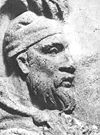- Dacology
-
Dacology is a branch of Thracology which focuses on the scientific study of Dacia and Dacian antiquities[original research?] and is a regional and thematic branch of the larger disciplines of ancient history and archaeology. A practitioner of the discipline is a Dacologist. Dacology investigates the range of ancient Dacian culture (language, literature, history, religion, art, economics, and ethics) from c. 1000 BC[citation needed] up to the end of Roman rule in the 4th-7th centuries AD. It is directly subordinated to Thracology,[original research?] since Dacians are considered a branch of the Thracians by most mainstream research[1] and historical sources.[2] Other theories sustain that the Daco-Thracian relation is not as strong as originally thought[3] [4] and as such Dacology has the potential to evolve as an independent discipline from Thracology.[original research?]
Contents
History
One of the first mentions of the term Dacology was done by the historian Radu Vulpe at the 2nd International Congress of Thracology in September 1976 in connection with the Romanian historians Bogdan Petriceicu Hasdeu and Ion I. Russu.[5][not in citation given] The Romanian Thracology Institute I.G Bibicescu, part of Romanian Academy, was founded in Bucharest in the same year.[6] One of his first directors was the thracologist Dumitru Berciu (1907–1998).
The related term Thraco-Dacology also exists, eluding to Thraco-Dacian, and one of the first uses is also from around 1980, in the Romanian government archive.[7][dubious ]
The term Dacologist has been negatively affected by the association with Protochronism. Some researchers prefer to call themselves Thracologists instead of Dacologists[citation needed], out of fear of being associated with the term Dacoman[citation needed], a pejorative used for neo-Protochronists[weasel words] especially by the Romanian Thracologists.[3] This choice of title is made in the context of their research being focused on the Dacians and without necessarily promoting a strong connection between the Thracians and Dacians.[3]
Dacologists
Researchers who have been noted in the field of Dacology[original research?] include:
- Bogdan Petriceicu Hasdeu
- Ion I. Russu[8]
- Radu Vulpe
- Andrei Vartic
International Congress of Dacology
There have been 11 editions of the International Congress of Dacology[9] organized so far. However, they have been organized by the controversial Dacomanic group around Napoleon Săvescu, thus making the term Dacology synonymous with Protochronism in this ambiance.
See also
Notes
- ^ Encyclopedia Britannica online, Dacia.
- ^ Strabo VII.3.2
- ^ a b c Olteanu.
- ^ Georgiev (1960) 39-58
- ^ Vulpe 1980, p. 95.
- ^ Archäologien Europas: Geschichte, Methoden und Theorien By Peter F. Biehl, Alexander Gramsch, Arkadiusz Marciniak
- ^ RA42 1980, p. 181.
- ^ SCL 1983, p. 267.
- ^ DaciaRevue 2005, p. 101.
References
- Olteanu, Sorin. "Linguae Thraco-Daco-Moesorum" (in Romanian, partially in English). Linguae Thraco-Daco-Moesorum. http://soltdm.com/. Retrieved 3 January 2010.
- Vulpe, Radu (1980) (in Romanian, English, French). Actes du IIe Congrès international de thracologie: Linguistique, ethnologie (ethnographie, folkloristique et art populaire), anthropologie. Bucharest: Editura Academiei. http://books.google.com/books?id=2TMaAAAAMAAJ.
- (in English, French)Dacia - Revue d'archéologie et d'histoire ancienne (Dacia - Review on Archeology and Old History) (Bucureşti, Romania: Institutul de Arheologie) 10. 2005. ISSN 0070-25lx. http://books.google.com/books?id=ulppAAAAMAAJ.
- Revista arhivelor (Romania: Arhivele Statului) 42. 1980. http://books.google.com/books?id=1kArAQAAIAAJ.
- (in Romanian)Studii şi cercetǎri lingvistice (Bucureşti, Romania: Academia Română) 3-6. 1983. http://books.google.com/books?id=ulppAAAAMAAJ.
External links
Dacia topics Dacian tribes: Aedi · Albocense · Anartes · Apuli · Artakioi · Biephi · Biessoi · Buri · Carpi · Cauci · Ciaginsi · Clariae · Costoboci · Cotini · Crobidae · Daci · Getae · Moesi · Osi · Peukini · Piephigi · Potulatense · Predasense · Rhadacense · Saldense · Scaugdae · Sense · Suci · Terizi · Teurisci · Trixae · Tyragetae · Troglodytae
Dacian kings: Culture and civilisation: Art, jewellery, treasures, tools (Bracelets) · Clothing · Foreign Relations (Greeks · Celts · Romans · Germanic tribes) · Warfare (Falx · Sica · Thracian warfare)
Sarmizegetusa · Argidava · Buridava · Cumidava · Piroboridava · Sucidava · More towns... · Davae · Dacian Fortresses of the Orăştie Mountains · Murus dacicusWars with the
Roman Empire:Roman Dacia: Dacia Traiana · Moesia · Scythia Minor · Dacia Aureliana · Diocese of Dacia · Dacia Mediterranea · Dacia Ripensis · Trajan (Bridge · Column) · Towns and cities · Castra · Limes (Alutanus · Moesiae · Porolissensis · Sarmatiae · Transalutanus · Trajan's Wall · Brazda lui Novac) · Language (Thraco-Roman · Eastern Romance substratum)Research on Dacia: Books on Dacia · Dacian archaeology · Archaeological sites in Romania · Dacology · Thracology · ProtochronismWikiProject • Commons • Dacian fortresses, settlements, Roman castra, limes from Romania: Google Maps • Google Earth Categories:- Dacia
- Archaeological sub-disciplines
- Thracology
- History of Romania
- Archaeology of Romania
- Dacian archaeology
Wikimedia Foundation. 2010.
